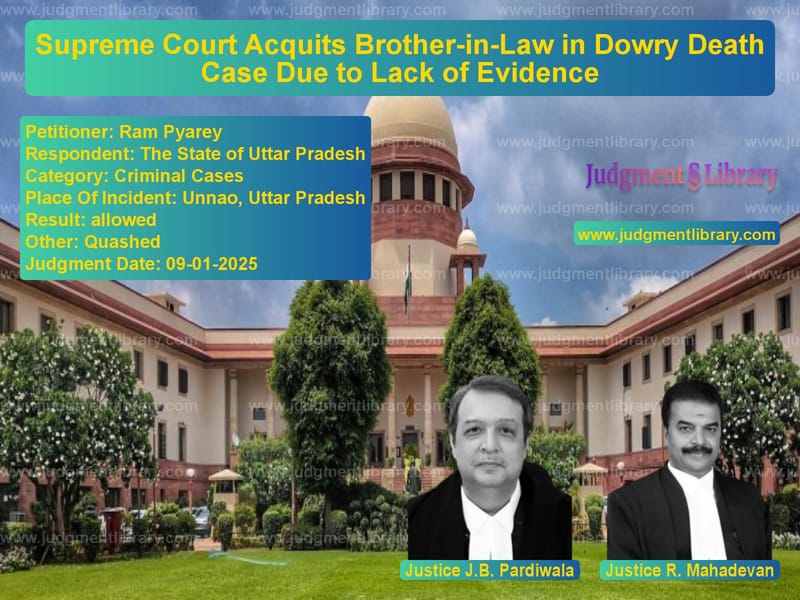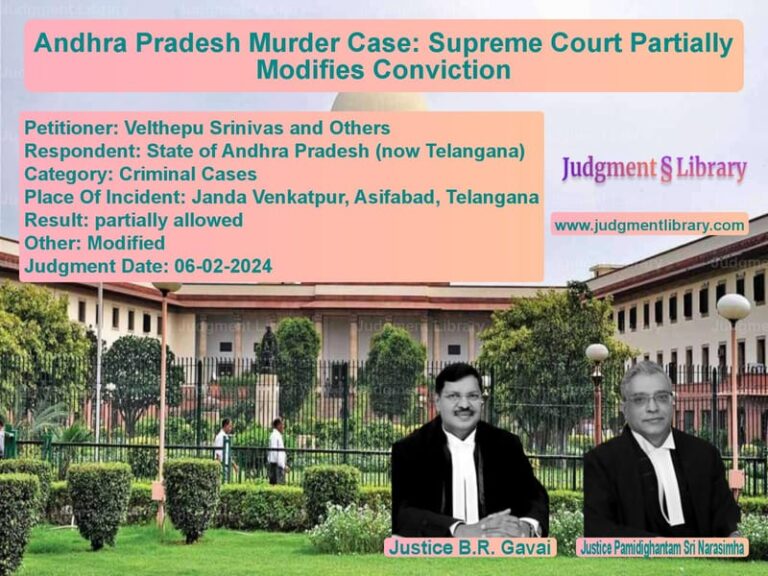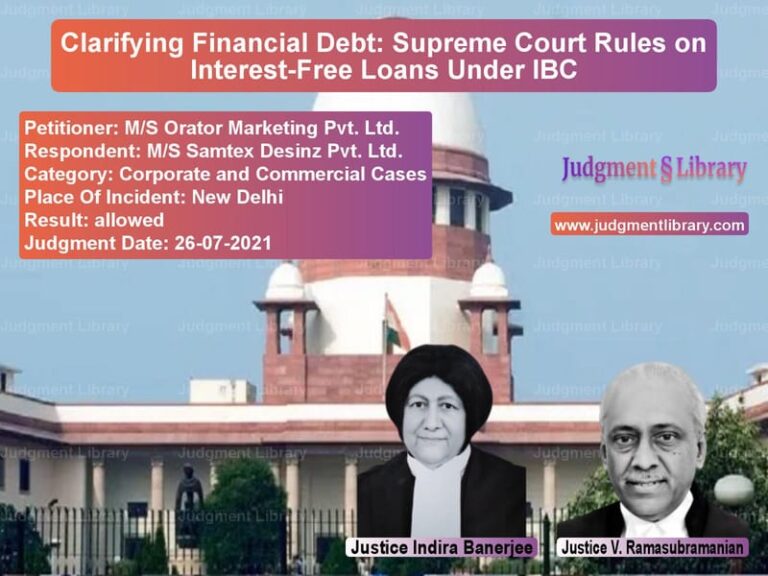Supreme Court Acquits Brother-in-Law in Dowry Death Case Due to Lack of Evidence
In a crucial judgment, the Supreme Court of India set aside the conviction of Ram Pyarey, the brother-in-law (Jeth) of a woman who died by suicide in a case related to dowry harassment. The ruling, delivered on January 9, 2025, emphasized that there was no substantial evidence linking the appellant to the alleged offense of abetment of suicide under Section 306 of the Indian Penal Code (IPC) and cruelty under Section 498A IPC.
Background of the Case
The case originated from an incident in the Unnao district of Uttar Pradesh. The deceased was married to Ram Sajeevan, and as per the prosecution, she was subjected to cruelty by her husband and in-laws, including the appellant, Ram Pyarey. It was alleged that she was harassed for dowry, particularly a buffalo and a gold chain, and eventually died by self-immolation on September 27, 1990.
Read also: https://judgmentlibrary.com/supreme-court-acquits-husband-in-1990-kolhapur-murder-case/
The deceased’s father lodged a First Information Report (FIR) at the Ajgain Police Station on the same day, naming her father-in-law, mother-in-law, husband, and brother-in-law (the appellant) as the accused.
Key Legal Issues
- Whether the appellant played any active role in abetting the suicide.
- Whether there was sufficient evidence to establish cruelty or harassment as defined under Section 498A IPC.
- Applicability of Sections 113A and 113B of the Indian Evidence Act concerning the presumption of abetment of suicide and dowry death.
Trial Court Conviction and High Court’s Decision
- The trial court framed charges under Section 304B IPC (dowry death) but later convicted the accused under Sections 306 and 498A IPC, acquitting them of dowry death.
- The appellant, along with other accused, was sentenced for abetment of suicide and cruelty.
- During the pendency of the appeal in the High Court, the appellant’s parents-in-law passed away, and his brother (the husband of the deceased) completed his sentence without filing an appeal.
- The Allahabad High Court dismissed the appeal and upheld the conviction.
Supreme Court’s Observations
- “We are of the view that there is practically no evidence on the basis of which it could be said that the appellant herein as brother-in-law abetted the commission of suicide.”
- “The law as regards the abetment of suicide punishable under Section 306 of IPC is now well settled.”
- “The courts below laid much emphasis on Section 113B of the Evidence Act, 1872, which deals with dowry death. However, it must be noted that under Section 113B, the Court shall presume dowry death, unlike Section 113A, where the provision states that the Court may presume abetment of suicide.”
- “For presumption under Section 113A, there must be cogent evidence of cruelty and harassment. In the absence of such evidence, the court cannot straightway invoke the presumption.”
Arguments by the Appellant (Ram Pyarey)
- The appellant contended that there was no direct evidence linking him to the alleged harassment or abetment.
- He argued that the deceased’s suicide was a tragic event but not a result of any instigation on his part.
- He pointed out that the original charge was for dowry death, but the trial court altered it to abetment of suicide without clear evidence.
Arguments by the Respondent (State of Uttar Pradesh)
- The prosecution argued that the deceased was subjected to continuous harassment, which led her to take the extreme step.
- They claimed that even though the appellant was the brother-in-law, he was involved in pressuring the deceased for dowry.
- The State relied on Sections 113A and 113B of the Evidence Act to support the presumption of abetment.
Final Judgment
- The Supreme Court allowed the appeal and acquitted the appellant.
- The conviction and sentence imposed by the trial court and confirmed by the High Court were set aside.
- The Court held that the prosecution failed to provide concrete evidence proving the appellant’s role in abetting the suicide.
- The Court further clarified that mere presence in the family does not automatically imply involvement in harassment.
Conclusion
This judgment reinforces the principle that conviction for abetment of suicide must be based on clear and convincing evidence rather than mere assumptions. It highlights the importance of carefully analyzing the scope of presumptions under Sections 113A and 113B of the Evidence Act and ensuring that the burden of proof is adequately discharged.
Petitioner Name: Ram Pyarey.Respondent Name: The State of Uttar Pradesh.Judgment By: Justice J.B. Pardiwala, Justice R. Mahadevan.Place Of Incident: Unnao, Uttar Pradesh.Judgment Date: 09-01-2025.
Don’t miss out on the full details! Download the complete judgment in PDF format below and gain valuable insights instantly!
Download Judgment: ram-pyarey-vs-the-state-of-uttar-p-supreme-court-of-india-judgment-dated-09-01-2025.pdf
Directly Download Judgment: Directly download this Judgment
See all petitions in Fraud and Forgery
See all petitions in Bail and Anticipatory Bail
See all petitions in Judgment by J.B. Pardiwala
See all petitions in Judgment by R. Mahadevan
See all petitions in allowed
See all petitions in Quashed
See all petitions in supreme court of India judgments January 2025
See all petitions in 2025 judgments
See all posts in Criminal Cases Category
See all allowed petitions in Criminal Cases Category
See all Dismissed petitions in Criminal Cases Category
See all partially allowed petitions in Criminal Cases Category







